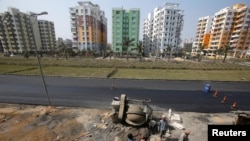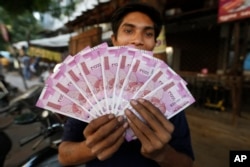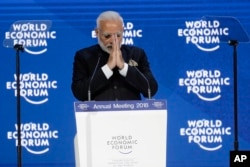India has projected its economy will grow by 7 to 7.5 percent this year regaining the position of the world’s fastest growing major economy as it shrugs off the disruptive impact of a currency ban and tax reform.
But the government has warned that rising international oil prices pose a risk to a country that depends heavily on energy imports.
“The economy seems to be picking up quite nicely, quite robustly,” said the country’s chief economic adviser, Arvind Subramanian presenting the country’s annual economic survey. “Several indicators of activity show manufacturing growth, even investment, exports, credit, have all started to pick up. The direction is very good.”
The projections for Asia’s third largest economy are in line with recent forecasts by the World Bank and the International Monetary Fund.
The revival is good news for India where growth had flagged to a three-year low last year disappointing a country that had boasted of surpassing China to become the world’s fastest growing economy in 2015.
India's slowdown was at variance with many countries where growth has been picking up.
It was blamed on two major policy reforms that came within six months of each other. Businesses were disrupted for many months last year as the government scrambled to replace cash following a currency ban that sucked out 86 percent of the country’s cash. A long overdue, but poorly implemented tax reform called the Goods and Services Tax (GST) implemented last July resulted in more chaos for businesses.
“The temporary impact of demonetization and GST have dissipated. Corrective actions have been taken,” said Subramanian expressing optimism about the new growth projections.
The government said both measures have helped by increasing the numbers of people paying taxes.
Returning the momentum of growth is crucial for India as it pitches itself as an attractive destination for international investors. Indian Prime Minister Narendra Modi wooed investors last week at the World Economic Forum held at Davos saying that protectionism is gaining ground and globalization is losing its appeal, but India is open for business.
The reviving economy is also good news for Modi’s Hindu nationalist government, as it gears up for general elections next year. Economists say the government is expected to focus on rural development programs and small businesses in its upcoming budget due to be presented on Thursday as it searches for ways to create jobs for its huge young population.
“The world is extremely optimistic about India. The budget 2018 will add new vigor to India’s development and fulfill the aspirations of people,” the prime minister tweeted as parliament opened on Tuesday.
The survey also highlighted the challenges faced by India’s huge rural population and said farmlands that are not irrigated are experiencing the adverse impact of climate change — extreme temperatures and rainfall deficiencies. Alleviating the plight of farmers is a major challenge for the government.







